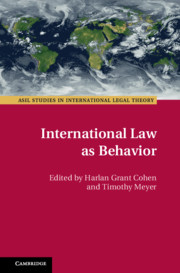Book contents
- International Law As Behavior
- ASIL Studies in International Legal Theory
- International Law As Behavior
- Copyright page
- Dedication
- Contents
- Tables
- Contributors
- Acknowledgments
- 1 International Law As Behavior
- 2 Deadlines As Behavior in Diplomacy and International Law
- 3 Cooperating without Sanctions
- 4 Egocentric Bias in Perceptions of Customary International Law
- 5 Explaining the Practical Purchase of Soft Law
- 6 Toward an Anthropology of International Law
- 7 Transnational Collaborations in Transitional Justice
- 8 Advancing Neuroscience in International Law
- 9 The Missing Persons of International Law Scholarship
- 10 The Wrong Way to Weigh Rights
- Index
4 - Egocentric Bias in Perceptions of Customary International Law
Published online by Cambridge University Press: 15 March 2021
- International Law As Behavior
- ASIL Studies in International Legal Theory
- International Law As Behavior
- Copyright page
- Dedication
- Contents
- Tables
- Contributors
- Acknowledgments
- 1 International Law As Behavior
- 2 Deadlines As Behavior in Diplomacy and International Law
- 3 Cooperating without Sanctions
- 4 Egocentric Bias in Perceptions of Customary International Law
- 5 Explaining the Practical Purchase of Soft Law
- 6 Toward an Anthropology of International Law
- 7 Transnational Collaborations in Transitional Justice
- 8 Advancing Neuroscience in International Law
- 9 The Missing Persons of International Law Scholarship
- 10 The Wrong Way to Weigh Rights
- Index
Summary
A substantial body of research in social psychology suggests that egocentric biases inhibit individuals’ ability to discern norms. This chapter identifies and explains two of those biases - the False Consensus Effect and the False Uniqueness Effect - and then explores their relevance and implications for efforts to identify customary international law (CIL). Among other things, the analysis offers insights on the persistent objector rule, the origins and evolution of CIL, and the merits of rational choice models of state action.
Keywords
- Type
- Chapter
- Information
- International Law as Behavior , pp. 74 - 97Publisher: Cambridge University PressPrint publication year: 2021

